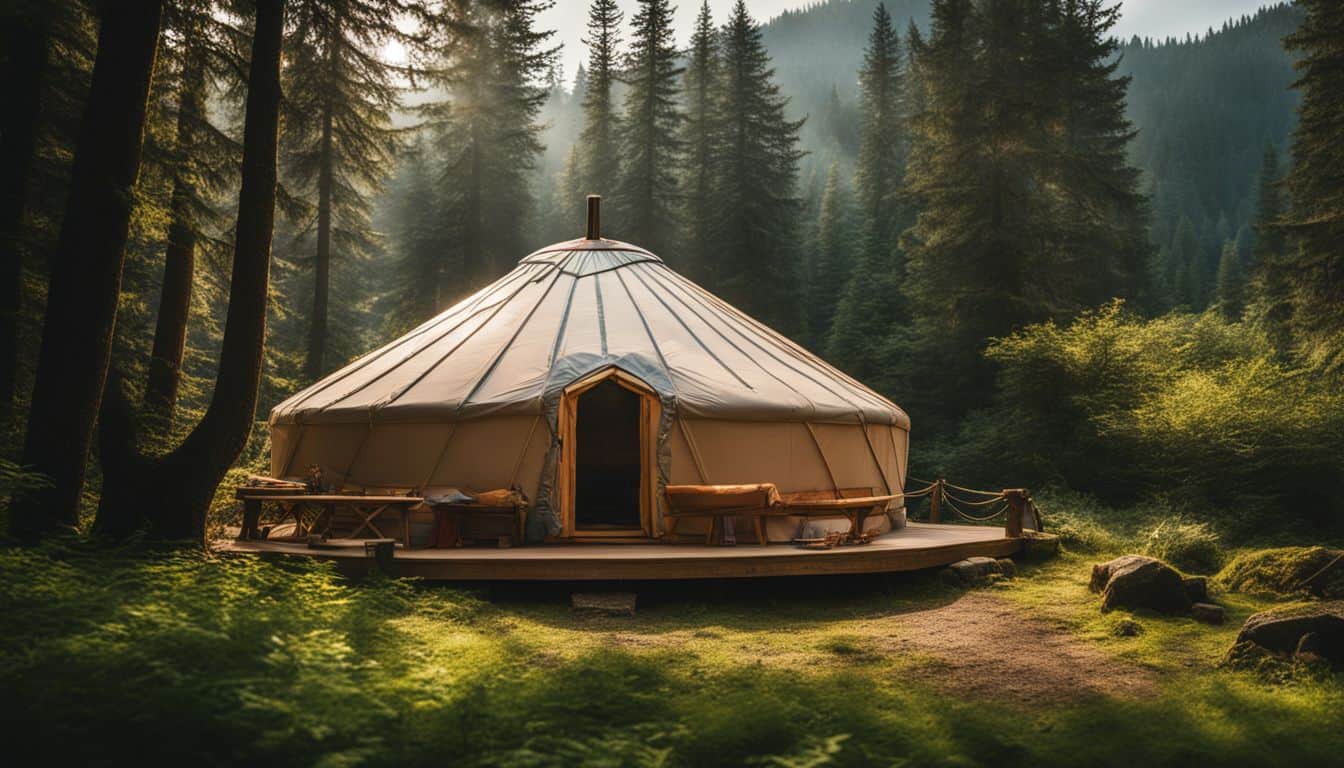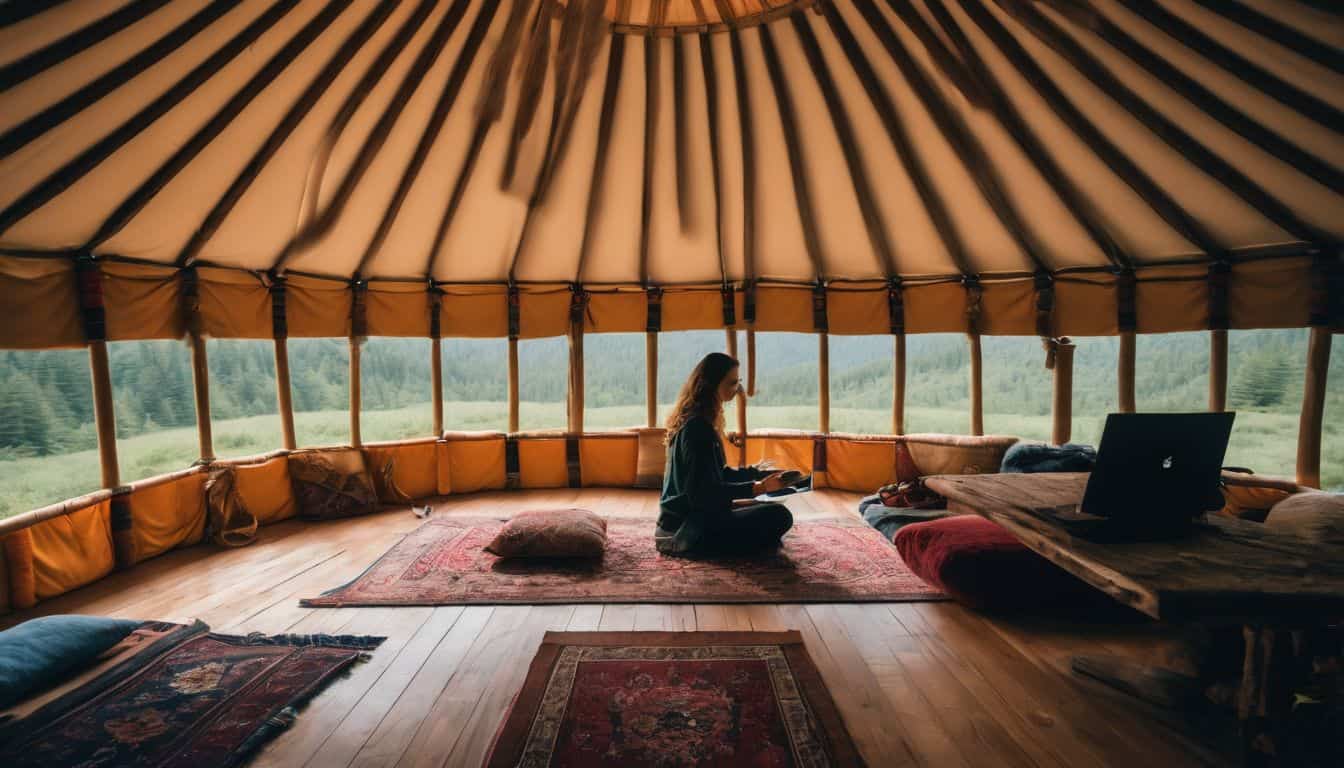Yurts, once synonymous with the nomadic lifestyles of Central Asia, are now gaining popularity as modern solutions for remote work and alternative living. Their eco-friendly design, adaptability, and affordability make them ideal for individuals seeking a unique and sustainable way to balance productivity with lifestyle. As remote work continues to redefine how and where we live, yurts offer an intriguing option for those looking to escape conventional spaces while staying connected.
Key Takeaways
- Yurts provide eco-friendly, affordable living spaces tailored for remote work and alternative lifestyles.
- Modern yurts are equipped with amenities like Wi-Fi, heating, and electricity to ensure comfort and productivity.
- Their portability and quick setup make them ideal for flexible living or working arrangements.
- Yurts foster creativity and well-being by offering a strong connection to nature.
- Customization options allow yurts to serve as offices, studios, guest rooms, or full-time homes.

The Evolution of Yurts: From Tradition to Modernity
Nomadic Origins Meet Contemporary Innovation
Traditional yurts—known as “gers” in Mongolia—were designed for mobility, durability, and simplicity. These circular dwellings provided shelter in extreme climates while enabling nomadic tribes to move freely. Modern yurts retain this portability but incorporate advanced materials like insulated walls, durable fabrics, and integrated electrical systems. Today’s yurts are not only functional but also stylish, offering year-round comfort in diverse environments.
Related: The Art of Yurt Making: Traditional Techniques and Modern Innovations
Sustainability at Its Core
Modern yurts are constructed using environmentally friendly materials such as bamboo, reclaimed wood, and canvas. Their minimal foundation requirements reduce land disturbance, making them an eco-conscious choice. Additionally, their circular design promotes energy efficiency by evenly distributing heat. Many yurt owners integrate solar panels, rainwater harvesting systems, and composting toilets to further reduce their ecological footprint.
Related: Sustainable Living: How Yurts Are Revolutionizing Eco-Friendly Homes
Yurts as Remote Workspaces
A Creative Haven for Digital Nomads
The rise of remote work has sparked demand for unique workspaces that blend productivity with inspiration. Yurts excel in this role by providing:
- Reliable Connectivity: Many modern yurts can be equipped with Wi-Fi routers and electrical outlets for uninterrupted digital work.
- Natural Light: Skylights and large windows reduce reliance on artificial lighting while boosting mood and focus.
- Distraction-Free Zones: A yurt’s physical separation from the main house creates a dedicated workspace that promotes concentration.
Whether set up in backyards or nestled in scenic rural locations, yurts offer remote workers the chance to design their ideal environment—a blend of tranquility and functionality.
Portability Meets Flexibility
Unlike traditional office setups or home renovations, yurts can be assembled within days and relocated as needed. This flexibility is invaluable for digital nomads or individuals who anticipate changes in work location or lifestyle. Modular yurt kits make assembly straightforward, allowing users to adapt their workspace to new terrains or climates.
Related: What is Yurt Camping?

Lifestyle Benefits of Living in a Yurt
Affordable Housing Without Compromise
Yurts are significantly more affordable than conventional homes or office buildings. Prices range from basic kits costing a few thousand dollars to luxury models with high-end finishes. This affordability makes yurts appealing for:
- First-time homeowners seeking simplicity.
- Entrepreneurs launching glamping retreats or eco-tourism businesses.
- Families aiming for a mortgage-free lifestyle.
Connection to Nature Enhances Well-Being
Living or working in a yurt fosters a deep connection with nature—a benefit often overlooked in urban settings. Circular layouts create an immersive experience where residents can enjoy panoramic views through windows or skylights. Studies show that exposure to nature reduces stress levels, enhances creativity, and improves overall mental health—key advantages for remote workers seeking balance.
Versatility Beyond Expectations
Modern yurts are highly customizable to suit diverse needs. They can function as:
- Home offices or creative studios.
- Guest accommodations or vacation rentals.
- Yoga retreats or meditation spaces.
- Full-time residences equipped with off-grid systems.
Owners can personalize layouts, insulation levels, flooring materials, and interior designs to match their lifestyle preferences.
Challenges to Consider
While yurts offer numerous advantages, they come with certain limitations:
- Climate Control: Managing temperature and humidity can be challenging in extreme weather conditions without proper insulation or heating/cooling systems.
- Storage Limitations: Open layouts mean less built-in storage space compared to traditional homes.
- Noise Levels: Thin walls may not provide optimal soundproofing.
- Permitting Issues: Local zoning regulations may restrict yurt installations depending on size or intended use.
These challenges require careful planning but are often outweighed by the benefits of flexibility and sustainability.
Practical Examples: Yurts in Action
Real-Life Applications
- Remote Work Retreats: Digital nomads have embraced yurts as portable offices set up in scenic locations like forests or mountains.
- Eco-Tourism Ventures: Entrepreneurs use yurts as accommodations for glamping sites that attract travelers seeking sustainable vacations. Related: The Rise of Yurt Retreats in Wellness and Eco-Tourism
- Family Living: Some families opt for larger yurts with multiple rooms as affordable alternatives to traditional housing.
Conclusion
Yurts represent an innovative solution for modern remote work and lifestyle needs—combining ancient design principles with contemporary amenities. Their affordability, sustainability, portability, and versatility make them ideal for digital nomads, eco-conscious individuals, and those seeking a closer connection to nature.
As the demand for flexible living spaces grows alongside the remote work revolution, yurts stand out as practical yet inspiring options that redefine how we live and work.
Related: Exploring the History and Cultural Significance of Yurts Across the World
Next Steps
If you’re considering a yurt for remote work or lifestyle purposes:
- Research yurt kits based on your budget and climate needs.
- Check local zoning regulations before installation.
- Explore customization options like solar panels or insulation upgrades.

Leave a Reply